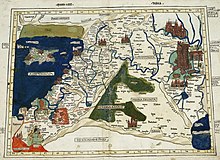Lunula fertilis


Lunula fertilis[1] (e voce Anglica Fertile Crescent[2]; Arabice الهلال الخصيب al-hilāl al-chasīb; Hebraice הסהר הפורה) est regio lunaris in Medio Oriente quae hodiernas Iraquiam, Syriam, Libanum, Israel, Palaestinam, et Iordaniam comprehendit, una cum septentrione Cuvaiti, meridiana et oriente Turciae, et occidentali Iraniae partibus.[3][4] Cui regioni nonnulli auctores Cyprum et septentrionalem Aegyptum adsigant.
Lunula Fertilis putatur prima regio ubi agricultura consistens crevit, cum homines silvas aliamque vegetationem naturalem purgare et commutare coeperunt ad plantas ut fruges nuper domitu effectas incolerent. Qua pro causa primae hominum civilizationes, sicut Sumer in Mesopotamia, floruerunt.[5] Inter inventa technologica hac in regione facta numerantur evolutio agriculturae et adhibitio irrigationis, scripturae, rotarum, et vitri, quorum plurimi primum in Mesopotamia creverunt.
Historia
[recensere | fontem recensere]Hodie haec pars quasi cunabula neolithicae commutationis habetur, id est translatio consuetudinum e vita venationi dedita ad agri cultum et rem pecuariam. Hic etiam veterrimae totius orbis terrarum urbes conditae sunt.
Nexus interni
Notae
[recensere | fontem recensere]- ↑ Robert Orth, Geobiblica: Lectiones de geographia biblica in Pontificio Instituto Biblico habitae (Romae 1965) [ibi: 9. “Lunula fertilis” semitica; 10. Ugarit, Hethaei, Horaei, Hyksos].
- ↑ Ab Iacobo Henrico Breasted anno 1914 inventum.
- ↑ Haviland, William A.; Prins, Harald E. L.; Walrath, Dana; McBride, Bunny (13 Ianuarii 2013). The Essence of Anthropology (tertia ed.). Belmont in California: Cengage Learning. p. 104. ISBN 978-1111833442.
- ↑ Ancient Mesopotamia/India. Culver City in California: Social Studies School Service. 2003. p. 4. ISBN 978-1560041665.
- ↑ Editors of Encyclopaedia Britannica. Fertile Crescent. Cantabrigiae: Cambridge University Press.
Bibliographia
[recensere | fontem recensere]- Anderson, Clifford Norman. 1972. The Fertile Crescent: Travels in the Footsteps of Ancient Science. Ed. secunda. Fort Lauderdale: Sylvester Press.
- Breasted, James Henry. 1914. "Earliest Man, the Orient, Greece, and Rome." In Outlines of European history, ed. J. H. Robinson, J. H. Breasted, et C. A. Beard. Bostoniae: Ginn. Vol. 1, p. 56.
- Diamond, Jared, 1997. Guns, Germs and Steel: A Short History of Everybody for the Last 13,000 Years.
- Deckers, Katleen. 2011. Holocene Landscapes through Time in the Fertile Crescent. Turnhout: Brepols.
- Ephʻal, Israel. 1982. The Ancient Arabs: Nomads on the Borders of the Fertile Crescent 9th–5th Centuries B.C. Hierosolymis: Magnes Press.
- Kajzer, Małgorzata, Łukasz Miszk, et Maciej Wacławik. 2016. The Land of Fertility I: South-East Mediterranean since the Bronze Age to the Muslim Conquest. Newcastle upon Tyne: Cambridge Scholars Publishing.
- Kozłowski, Stefan Karol. 1999. The Eastern Wing of the Fertile Crescent: Late Prehistory of Greater Mesopotamian Lithic Industries. Oxoniae: Archaeopress.
- Potts, Daniel T., ed. 2012. A Companion to the Archaeology of the Ancient Near East. John Wiley & Sons. ISBN 9781405189880. doi:10.1002/9781444360790. Nuntius apud Archive.org.
- Steadman, Sharon R., et Gregory McMahon. 2011. The Oxford Handbook of Ancient Anatolia: (10,000-323 BCE). Oxoniae: Oxford University Press. ISBN 9780195376142. Nuntius apud Google.
- Thomas, Alexander R. 2010. The Evolution of the Ancient City: Urban Theory and the Archaeology of the Fertile Crescent. Lanhamiae Terrae Mariae: Lexington Books / Rowman & Littlefield Publishers.
Nexus extreni
[recensere | fontem recensere]| Vicimedia Communia plura habent quae ad Lunulam Fertilem spectant. |
